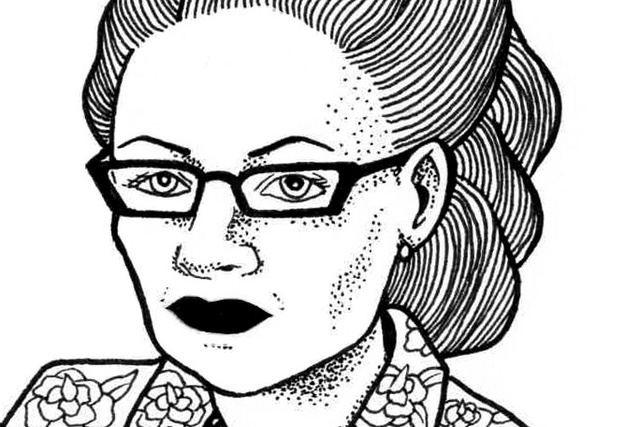In the seven days before I sat down with Tarah Wheeler Van Vlack, Microsoft had publicly apologized for hiring scantily clad female dancers for a company party at the GDC gamer conference and Amazon had released a report claiming that no gender wage gap existed at the company.
In other words, the time was ripe to chat with the West Seattle resident and author of the new book Women in Tech, which came out Tuesday and gives women an insider’s knowledge of how to break into the tech field and earn a fair wage for their work. Chatting over coffee in the Fairmont’s Terrace Bar on Thursday, Van Vlack says she entered tech as just another nerd but quickly “discovered the fact that I had boobs mattered.”
Now the co-founder and CEO of her own company, Van Vlack is committed to making women’s contributions to tech show where it counts: the paycheck.
When did you realize “boobs mattered”? Sometime after entering technology as a career field as opposed to academia. And I think that I was very surprised to find out that I was experiencing technology differently than the other people that I’d spoken to did, and I being a social scientist started asking myself why this was happening. And discovered that there really were some pretty serious problems with being a woman in tech. You can see when you look around and you just don’t see other women. That is where it really starts. There are jobs that I had where I was the only woman. There’s companies where they still don’t have any female developers. It’s very, very common.
So there was no “ah-ha!” moment? There were lots and lots and lots of “ah-ha!” moments.
Do any stick out in particular?One of the things I try to do is not focus too much on any particular company. I’m sure you know about the disaster last week at GDC. Everybody knows about that. When that kind of thing happens, it’s never one any one individual person’s fault. It’s not like someone set out and said we’re going to objectify women and I’m going to make this a party where women don’t feel comfortable. And yet it ended up happening, right? The idea that you can try to find the single person to blame for all of this is crazy because it’s not a single person, it’s that people don’t acknowledge the devastating effects of discrimination because they’ve never experienced it.
I’m curious what your thoughts are on Amazon’s report that there’s no gender wage gap at the company. [Incredulous laughter] What? Did it come out just this morning?
The Times wrote yesterday: “Amazon.com said Wednesday that there’s no gender or ethnic imbalance in how it pays its employees … ” [More laughter] I have no comment on any individual company’s policies or statements.
Your laughter may suffice as an answer. I’m happy to call out the companies that do well, but if I start calling out the companies that do poorly, in some ways the negative space created by that lets other companies think, “We may be bad, but we’re not as bad as those people.” And I won’t take that pressure off of the people who are below the curve but not at the bottom of the pile.
I can understand that, but it also seems like it might be letting Amazon off the hook. Right now there are Times subscribers who think, “Oh, great, women in tech are doing great.” Yeah. [Long pause]
All right, moving on.What I’ll tell you is this: I get stories from women who know me, from lots and lots of different companies. Who tell me that their treatment is absolutely horrific. And when they do that, it tells me where to refer women to and where not to refer them to. And there are companies that you’ll never hear me tell women to work at.
But the truth is I’d rather give women personal advice on negotiating. As far as I’m concerned, the only thing that gives women more money is giving them more money, and there’s a culture where salary negotiation is expected and women don’t participate in it in the way men do, and that sets the tone. The personal contribution I can make isn’t telling them where not to work—because we’re all going to make the choices we need to make—but on how to get more money from where they’re going to be working at. The single thing that gives women economic power is paying them more.
And what are your bullet points to negotiating?Absolutely number one is never say “yes” to the first offer. Number two is don’t name a number first. If you do those two things, I see that approximately 90 percent of the wage gap between men and women disappears. Do not name a number first. Don’t do it.
Why do you think women struggle with those two things more than men? Negotiating is one of those things like handshakes or tying a tie that has just turned into one of the sets of masculine skills. There are a lot of skill sets that we unnecessarily make masculine or feminine, which I personally have a problem with because I don’t think skill sets are gendered.
So when a woman with three kids has 10 g’s more a year in her pocket because she’s followed my advice—we all have issues, we’ve all got problems, we’ve all got lives we got to deal with—but I can wake up with in the morning and go a woman with kids has more money in her pocket because of stuff I’ve put out in the world. I’m OK with that.
Speaking as a man, I sometimes worry that these conversations put the onus on women to change their behavior. How do you grapple with that? I grapple with it by acknowledging something I’ve noticed over the last several years of dealing with diversity, which is that companies don’t give a fuck and only women can solve this problem. I’ve tried probably five initiatives to reach out to companies to get them to team up to solve this problem, and it’s been my experience that that potato gets passed super-fast. No one is willing to take any kind of responsibility with that issue within companies. Women can individually take this advice and improve their lot. I don’t have a better solution than that, because I’ve never been able to get a large company to do anything other than push big-dollar internal initiatives that they can put out press releases about.
This conversation has been edited for length.








